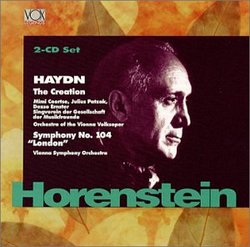A "Steady-State" Creation
Johannes Climacus | Beverly, Massachusetts | 10/07/2008
(4 out of 5 stars)
"Horenstein recorded relatively little in the studio, and even less of choral repertoire. For that reason alone, this reissue from Vox is treasurable, even though this flawed production could never serve as one's "basic library selection."
Horenstein's conception of Haydn's masterpiece is serious, steady, even stately. Tempos range from moderate to very slow ("the heavens are telling" is nearly twice as long as Solti's brisk romp), and deliberation tends to eclipse spontaneity. Horenstein's loving attention to details of texture and scoring is a definite plus: one could almost say that this is the *Creation* Klemperer never got around to recording. On the other hand, nearly all of the great celebratory choruses and sprightlier arias are lacking in vitality; this is very far from being "present at the Creation"--indeed, it's more like creative passion "recollected in tranquillity."
If the singing and orchestral playing were better, Horenstein could get away with his unusual "steady state" view of the cosmos. But, alas, the singing is effortful and the playing soggy. The soloists bring plenty of character to their respective roles; if only they had more pleasing voices! Deszö Ernster sounds less like a bringer of health and healing (Raphael's traditional role in Christian Angelology) and more like a certain Stone Guest bearing decidedly ill tidings to Don Juan. Julius Patzak, though a famous name from earlier recordings, sings well below his best here; mellifluous he is not. Mimi Coertse pleases intermittently (her "bird" aria, despite some uncertain intonation, is quite effective) thanks to a "smile in the voice", though her timbre gets squally under pressure. Ernster and Coertse bring these liabilities to their portrayals of Adam and Eve as well.
Indeed, there might seem to be few redeeming qualities to justify reissuing this relic from the 1950's (after a very long absence from the catalog). To add yet one more item to my litany of negatives: the early stereo recording is coarse, two-dimensional and suffers distortion at high volumes (particularly noticeable when the soloists are singing in the upper reaches of their registers). And yet, and yet. . . Horenstein was a genius, and brings unique insights to everything he conducts--including this otherwise substandard *Creation.* With more distinguished forces, and a recording to do it justice, Horenstein might have given us a truly remarkable interpretation of this evergreen oratorio. What he did give us is sufficiently distinctive--slow tempos, deliberate manner, and all--to warrant acquisition, at lest by those interested in historic recordings. if you fancy *Creation* done with minimal surface excitement and maximal "inwardness," this may be for you.
If your library has room for only one "historical" rendition of *Creation*, however, I would probably choose either Wöldike (on Vanguard) or Fricsay (on DG) in preference to Horenstein. Wöldike, in particular, achieves something like Horenstein's depth of inwardness without sacrificing the score's inherent vitality. But I suspect both Fricsay and Wöldike are long gone (I haven't checked this website to see if they are available from any of Amazon's sellers), so by default Horenstein may be your best bet if you want a performance of historical value. Horenstein's rugged, no-nonsense account of the "London" Symphony (104) makes a generous bonus, though, once agian, no-one would choose it as a primary recommendation for the work."


 Track Listings (23) - Disc #1
Track Listings (23) - Disc #1